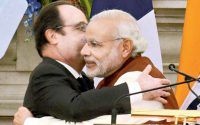$100 Website Offer
Get your personal website + domain for just $100.
Limited Time Offer!
Claim Your Website NowSupreme Court says 7-judge bench needed to decide Aadhaar issues
Source:- telegraphindia.com
New Delhi, March 27 (PTI): The Supreme Court on Monday made it clear that Aadhaar cards cannot be made mandatory by the government and its agencies for extending benefits of social welfare schemes.
A bench of Chief Justice J.S. Khehar and Justices D.Y. Chandrachud and S.K. Kaul, however, said that government and its agencies could not be stopped from seeking Aadhaar cards, which are based on biometrics, for non-welfare schemes such as opening of bank accounts.
The bench said that a seven-judge bench needed to be set up to decide a batch of petitions challenging the Aadhaar scheme on various grounds including that it infringes on the Right to Privacy of citizens.
However, the bench would be set up later, the court said.
Senior advocate Shyam Divan, appearing for one of the petitioners, alleged that the Union government is not following the various orders passed by the apex court that the usage of Aadhaar would be voluntary and not mandatory.
The apex court on August 11, 2015, had said that Aadhaar card will not be mandatory for getting benefits of government’s welfare schemes and barred the authorities from sharing personal biometric data collected for enrolment under the scheme.
However, on October 15, 2015, it had lifted its earlier restriction and permitted the voluntary use of Aadhaar cards in welfare schemes that also included Mahatma Gandhi National Rural Employment Guarantee Act, all pension schemes and the provident fund besides ambitious flagship programmes such as ‘Pradhan Mantri Jan Dhan Yojna’ of the National Democratic Alliance government.
A five-judge bench headed by the then Chief Justice H.L. Dattu had also put a caveat in its interim order for the Centre and said, “We also make it clear that Aadhaar card scheme is purely voluntary and not mandatory till the matter is finally decided by this court, this way or the other way.”
The bench, while including the four other schemes along with LPG and PDS where Aadhaar may be used, had said, “The Union of India to follow all other orders passed by this court since September 23, 2013.”
The bench had also said that a larger bench was required to be set up for final disposal of the petitions that also include the question as to whether the right to privacy is fundamental right.
Divan, representing one of the petitioners who has challenged the Aadhaar card scheme, had claimed that the Unique Identification Authority of India (UIDAI), which runs the programme, is neither backed by any law nor by any notification and is getting biometric details through private agencies.
The lawyers for the petitioners had contended that the scheme is “all pervasive” and is not full proof either and hence, cannot be used for other programmes.
On October 14, 2015, the apex court took note of Centre’s plea that Aadhaar cards be allowed to be used “voluntarily” for welfare programmes other than PDS and LPG schemes and asked whether it can assure that nobody would be at a ”disadvantageous” position for want of Aadhaar.



